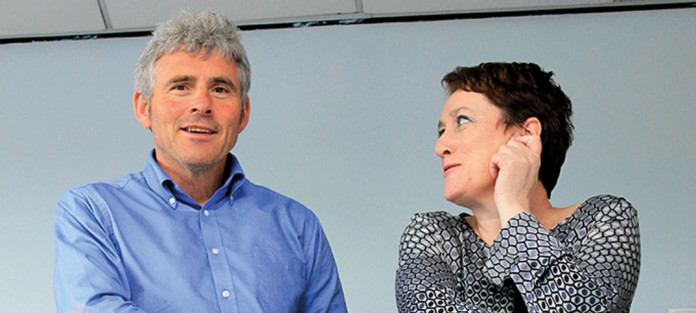Tan Parsons meets the directors of Dunns Food and Drinks to find out about why 2014 was so eventful for them and the company.
To put it mildly, 2014 was a busy year for Scottish wholesaler Dunns Food and Drinks. Not only did the Commonwealth Games take place during a hot, thirsty summer, but in the middle of it all in August, the Blantyre-based business acquired Dameck Drinks Company, the biggest craft beer supplier in Scotland, bringing an extra 1,200 beers into their portfolio.
It was a frantic time to take on a new business, particularly given that it increased the number of beer SKUs more than tenfold. But it has been a “roaring success”, says managing director Jim Rowan. “It has opened up so many doors for us and also in areas that geographically we have not been that strong in before,” he says. “What we’ve realised is that there’s a massive [consumer] customer base that want to buy the products – there’s a big opportunity.”
One option is to create an online craft beer club so that drinkers can buy direct. But as well as extra sales avenues, the Dameck business has brought challenges, too, such as having to reorder the warehouse to accommodate the new lines and making sure the company and its staff understand the 1,200 beers they have taken on.
“The range has been the single biggest issue, even down to how they are labelled,” says operations director Julie Dunn. “It’s all so trendy and funky and can be difficult to read.”
However, Dunns is one wholesaler that specialises in making its staff experts on the products they sell.
Dunn and Rowan pride themselves on their staff training – they want their company to be an employer that people want to work for. An example is the in-house training course – the Dunns Wine Academy. All members of staff are taken through a selection of modules to improve their knowledge of wines. This is built into each staff member’s personal plan so that they develop knowledge and qualifications that go on their CVs.
Dunn says you can’t expect someone who’s 20 and drinks WKD Blue to be a wine expert. Dunns Wine Academy is boosting the business by ensuring everyone knows the difference between a Cabernet Sauvignon and a Sauvignon Blanc, and that the Lindemans raspberry beer variant is called Framboise. Not knowing this sort of information can lose you sales.
“It’s making a huge difference in terms of customer perception,” says Dunn, who is also vice president of the Scottish Wholesale Association. “Sometimes, wholesalers can be considered just the ‘wheels’ – the people who get the boxes to your business. But we’ve realised that customers still want to talk to somebody about the wine. It’s the same with craft beer – they want people who are as passionate about the product as they are.”
Rowan says being an expert on what you sell is a strong way to compete against the biggest foodservice players, 3663 and Brakes, and to maintain your identity.
“If you become a competitor of theirs, it’s about boxes and turnover and you don’t have that level of expertise, because it comes down to pricing and level of service,” he says. “It becomes a commercial offering as opposed to a personal offering.
“Getting that personal relationship with your customer is hugely important. So with wine coming and craft beers coming in, it’s allowed us to talk to customers at a different level.”
What they believe sets their business apart from competitors is their range. Although they supply the likes of Booker and JW Filshill, they deal primarily with the on-trade. Their drivers deliver across Scotland and they believe they have the product range to be a one-stop shop for most customers.
Dunn says the company can offer everything from pine disinfectant to a bottle of Châteauneuf-du-Pape, with chicken and chips in between. Dunns is a member of the Country Range buying group and Rowan says being a member has been brilliant for own-label lines.
“We are becoming the complete wholesaler – for our customers, it’s basically a case of pick up the phone and get everything you need,” he says.
Dunns now offers considerable choice across craft beers, frozen foods, ambient foods, specialist spirits and wine. The only areas the group does not touch are meat and fresh fruit & veg, because they are such specialist operations. To do these well, Dunns would have to acquire existing businesses.
Dunns is aiming to hit a turnover of £32m in 2017/18, and is investing £1.7m over the next couple of years to do this. Also part of the plan is focusing on the opportunity presented by care homes – not only is there potential for extra sales, Dunns will be able to use its fleet more efficiently.
“In the on-trade, everybody expects their delivery before lunchtime, six days a week, so our fleet is out from 5.30am,” says Dunn. “But if you can get into more businesses, such as care homes and private schools, too, then it means you can use your fleet throughout the day.”
This sector can also provide wholesalers with regular business in the winter – a time when the food and drink side of the business is typically quieter. Dunns already has the food capability to cater for care homes, so by increasing its range of specialist non-food items, the group could make big gains.
“It’s very much a case of one call gets it all with care homes,” says Rowan.








